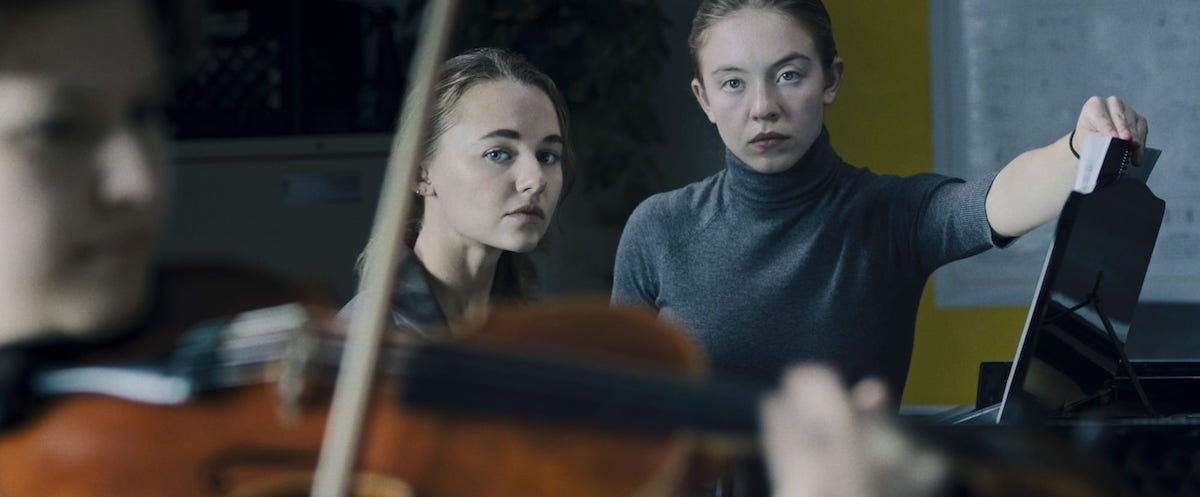What to Watch Verdict
'Nocturne' finds temptation and tragedy in a story about working one's self to death, where sheet music conjures an evil that's nefariously poetic in its invasive torments.
Pros
- +
🎹 Subtle ghost story.
- +
🎹 Respects the musical aspects.
- +
🎹 Sweet sorrow.
Cons
- -
🎹 A simple narrative of mad ambition.
- -
🎹 What can go wrong, will (repetitive).
In comparison to the trifecta of other "Welcome To The Blumhouse" titles, Nocturne is Mozart's "Marriage of Figaro" vs. three original tracks your high school garage band recorded, never popularized for a damn good reason. Zu Quirke's bargain streaming Black Swan recalls one of my favorite quotes from the last season of Schitt's Creek: "I all but perished in the name of an unrequited love for an industry that has burned me over and over again." Our obsessions with stardom and purpose and punishment through status comparisons is such a rapturous undoing for so many, which sets the tempo for Quirke's ode to the never good-enoughs. That consuming curse, the martyrdom, the constant lack of fulfillment that's powerful enough to drive someone stark-raving passionate.
For teenage Juliet (Sydney Sweeney), everything revolves around her piano mastery. She's practiced three hours a day since her fingers could press the keys, equating to tunnel-vision that focuses eyes for concert greatness. Yet, only her twin sister Vivian (Madison Iseman) is accepted into Juilliard's pianist program. Juliet sees everything as a competition, despite no intended ill-comparisons by Vivian's more successful career trajectory. Instead of rewarding Vivian with pride and support, Juliet finds a cursed notebook from a deceased student that turns the tides so to speak. Everything comes at a price, and in Juliet's case, that means destroying lives just for a first chair soloist seat with the prospect of impressing a Julliard scout.
To align Nocturne with Deathgasm, Juliet's arc alters when she thumbs through the pages of Moira Wilson's (Ji Eun Hwang) Music Theory notes. In it, she finds an arrangement that Juliet's private tutor (Ivan Shaw) identifies as Giuseppe Tartini's "Devil's Trill." The same composition we watch Moira perform on violin in the film's introduction, before the possessed pupil throws her body from a private room balcony. Evil comes alive through plucked strings and cursed chords, an audible trojan horse in the form of classical formations that represents the menace that can hide within suspicious meekness.
Sydney Sweeney's portrayal of repressed workaholic side-effects captures the devastation of a life more normalized. The way Juliet ascribes self-worth to awards and opportunities is a prison that she'll never escape. What Juliet fears most is the very thing Michael Stuhlbarg's Stanley Hyman would belittle: mediocrity. Sweeny's best work comes when her actions question whether the book holds any influence at all, or if Juliet's continued misdeeds are simply an extension of her unhealthy obsessions. A tortured performance that awakens demons one can never conquer, as Juliet willingly betrays anyone in her professional vicinity because nothing matters, in her mind, but rewarded accomplishments. Be the best, or be nothing. Sweeny excels when selling the tragedy in such a relatably paralyzing existential struggle for critical acclaim.
Of course, Nocturne adds supernatural layers to the creeping haunts within our minds. As Juliet learns more about the sunny-eye symbol that she begins seeing inside and outside Moira's scribblings, minor hallucinatory creeps invade the screen. Grotesque ghouls in the mirror, blinding lights that stop Juliet in her tracks, and these vile moments where Juliet becomes a devil of her own doing when switching off her shy, timid charms in favor of reflexively confident moments meant to inflict pain. While other thematically similar titles such as The Sonata lean heavier into summoning actual hellbeasts through instrumental means, Quirke plays games of the mind with supporting characters as pawns (Jacques Colimon's crush, for example). It's just as damning and devious, with more of an emphasis on Juliet's inconsideration and personal villainizing all in the name of some plaque or position.
We all, as people, want to be "good enough." Nocturne strives to remind us that not everyone can be the next virtuoso, and as long as we're the best versions of ourselves, we are good enough. Yet, specialized classrooms and overbearing parents instill the wrong brands of "hard work" in children who create an identity around benchmarks that can rank against competing trainees. It's a sorrowful orchestral tune that is an ode to the cloudiness of how "success" can vary in definition, and the dangers of replacing genuine cares and wholesome connections with grades, scores, or ruthless industries that will never, for a second, love us back. Perhaps not the most inventive or exemplary when it comes to the metaphors depicted, familiarizing more obvious narrative beats, but it's eerily proficient and ends with such a heartbreaking crescendo. Enough, in my book, to gain that final ovation.
The latest updates, reviews and unmissable series to watch and more!
Matt Donato is a Rotten Tomatoes approved film critic who stays up too late typing words for What To Watch, IGN, Paste, Bloody Disgusting, Fangoria and countless other publications. He is a member of Critics Choice and co-hosts a weekly livestream with Perri Nemiroff called the Merri Hour. You probably shouldn't feed him after midnight, just to be safe.


